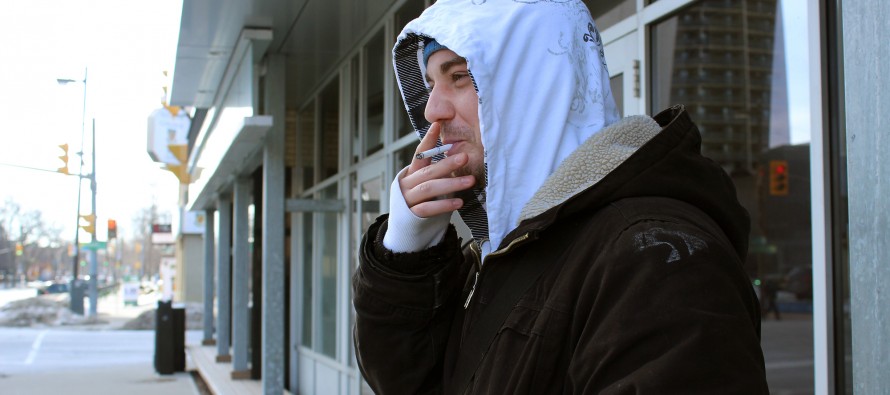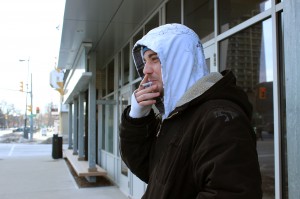Windsor school boards crack down on smokers


St. Clair College student Cody Raymond smokes in front of the MediaPlex in Windsor, Feb. 28. Raymond has smoked since the age of 13. (Photo by Taylor Busch)
by Taylor Busch
New anti-smoking ads are more relevant than people think.
The Canadian government’s most recent anti-smoking campaign features smokers who go back to the place they started smoking. In one commercial, a woman returns to her high school where she began her addiction.
Today, high schools are required to follow the Smoke-Free Ontario Act which has been in effect since 2006. The Act prohibits smoking on most school grounds and fines people who sell tobacco products to minors. However, local students have said two school boards in Windsor are not doing enough to discourage teenagers from smoking.
Cody Raymond, 24, was attending Dr. H.D. Taylor Public School in Windsor when he started smoking nine years ago. According to Raymond, many of his peers smoked at the time. Health Canada’s new 2014 Tobacco Report says 32.3 per cent of students in grades 6-9 are susceptible to smoking in Ontario today.
“When I was in grade school, there were a lot of students who smoked,” said Raymond. “I think it would have been good if they gave us the pros and cons of smoking to try and discourage us.”
Though he has tried to quit smoking twice since then, Raymond said he has never quit for more than a month at a time. According to a 2013 CBC Article, this is not uncommon. About 80 per cent of American high school students who smoke also smoke into adulthood.
Raymond said neither his grade school nor Catholic high school had programs in place to help students stop smoking.
“The only program I had access to was my doctor who supplied Nicorette gum and patches to first time quitters,” said Raymond.
Tamara Klinkhamer, 17, said she has smoked daily since attending Walkerville Collegiate Institute two years ago. Like Raymond, she also said her high school did little to discourage students from smoking and instead focused on anti-drug presentations.
“At my school, teachers give us breaks to go out and smoke,” said Klinkhamer. “A teacher will even stand there and watch their students smoke.”
Klinkhamer said this has happened at every high school she attended.
A youth engagement specialist for the Windsor-Essex County Health Unit said she has seen a decrease in youth smokers recently. She said students are responding well to educational presentations which are geared toward preventing them from starting to smoke.
“We give schools anywhere from five to 15 presentations each month depending on what their schedule is,” said Theresa Sarkis.
Sarkis said the health unit also offers assistance to students who want to quit smoking.
The latest survey for Windsor-Essex County schools revealed about eight per cent of students smoke regularly, which is close to the provincial average.
According to Leave the Pack Behind, a comprehensive tobacco control initiative for young adults, youth have very different smoking behaviors and quitting preferences than adults and therefore need messages and programs to be especially tailored for them.
“To help students quit, we give them information on who they can contact and what they can do,” said Sarkis. “The Windsor-Essex Health Unit is very interested in helping minors quit.”
Currently, local school boards are considering changing their smoking policies again. The new policy will prohibit all forms of tobacco on school property including all smoking paraphernalia such as electronic cigarettes.
Sarkis said stricter policies will likely help the number of student smokers continue to decrease in the future.







